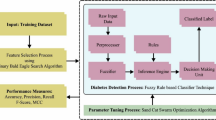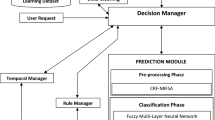Abstract
Artificial Immune Recognition System (AIRS) has showed an effective performance on several problems such as machine learning benchmark problems and medical classification problems like breast cancer, diabets, liver disorders classification. In this study, the resource allocation mechanism of AIRS was changed with a new one determined by Fuzzy-Logic. This system, named as Fuzzy-AIRS was used as a classifier in the diagnosis of atherosclerosis, which are of great importance in medicine. The proposed system consists of the following parts: first, we obtained features that are used as inputs for Fuzzy-AIRS from Carotid Artery Doppler Signalsusing Fast Fourier Transform (FFT), then these obtained inputs used as inputs in Fuzzy-AIRS. While AIRS algorithm obtained 75% maximum classification accuracy for 150 resources using 10-fold cross validation, Fuzzy-AIRS obtained 100% maximum classification accuracy in the same conditions. These results show that Fuzzy-AIRS proved that it could be used as an effective classifier for the medical problems.
Preview
Unable to display preview. Download preview PDF.
Similar content being viewed by others
References
Hirai, T., Sasayama, S., Kawasaki, T., Yagi, S.: Stiffness of systemic arteries in patients with myocardial infarction. A noninvasive method to predict severity of coronary atherosclerosis, Circulation, pp. 78–86 (1989)
Stefanadis, C., Stratos, C., Boudoulas, H., Kourouklis, C., Toutouzas, P.: Distensibility of the ascending aorta, comparison of invasive and non-invasive techniques in healthy men and in men with coronary artery disease. Eur. Heart J., 990–996 (1990)
Dart, A.M., Lacombe, F., Yeoh, J.K., Cameron, J.D., Jennings, G.L., Laufer, E., Esmore, D.S.: Aortic distensibility in patients with isolated hyper-cholesterolaemia, coronary artery disease, or cardiac transplant. Lancet, pp. 270–273 (1991)
Evans, D.: Doppler Signal Analysis. Ultrasound in Med. & Biol. 26, 13–15 (2000)
Saini, V.D., Nanda, N.C., Maulik, D.: Basic principles of ultrasound and Doppler effect. Doppler echocardiography (1993)
Sigel, B.: A brief history of Doppler ultrasound in the diagnosis of peripheral vascular disease. Ultrasound Med. Biol. 24, 169–176 (1998)
Muller, M., Ciccotti, P., Reiche, W., Hagen, T.: Comparison of color flow Doppler scanning, power Doppler scanning, and frequency shift for assessment of carotid artery stenosis. J. Vasc. Surg. 34, 1090–1095 (2001)
Evans, D.H., McDicken, W.N., Skidmore, R., Woodcock, J.P.: Doppler Ultrasound: Physics. Instrumentation and Clinical Applications (1989)
Vaitkus, P.J., Cobbold, R.S.C., Johnston, K.W.: A comparative study and assessment of Doppler ultrasound spectral estimation techniques part II: methods and results. Ultrasound Med. Biol. 14, 673–688 (1988)
Van Asten, W.N., Beijneveld, W.J., Pieters, B.R., et al.: Assessment of aortoiliac obstructive disease by Doppler spectrum analysis of blood flow velocities in the common femoral artery at rest and during reactive hyperemia. Surgery 109, 633–639 (1991)
Watkins, A.: AIRS: A Resource Limited Artificial Immune Classifier, A Thesis Submitted to the Faculty of Mississippi State University (2001)
Watkins, A., Timmis, J.: Artificial Immune Recognition System (AIRS): Revisions and Refinements. In: Proc. Int. Conf. on Artificial Immune Systems (ICARIS), pp. 99–106 (2002)
Goodman, D.E., Boggess, L., Watkins, A.: An Investigation into the source of power for AIRS, an artificial immune classification system. In: Proceedings of the International Joint Conference on Neural Networks (IJCNN 2003), Portland, Oregon, July 2003, pp. 1678–1683 (2003)
Kohavi, R., Provost, F.: Glossary of Terms. Editorial for the Special Issue on Applications of Machine Learning and the Knowledge Discovery Process 30(2/3) (1998)
Author information
Authors and Affiliations
Editor information
Editors and Affiliations
Rights and permissions
Copyright information
© 2006 Springer-Verlag Berlin Heidelberg
About this paper
Cite this paper
Polat, K., Kara, S., Latifoğlu, F., Güneş, S. (2006). A Novel Approach to Resource Allocation Mechanism in Artificial Immune Recognition System: Fuzzy Resource Allocation Mechanism and Application to Diagnosis of Atherosclerosis Disease. In: Bersini, H., Carneiro, J. (eds) Artificial Immune Systems. ICARIS 2006. Lecture Notes in Computer Science, vol 4163. Springer, Berlin, Heidelberg. https://doi.org/10.1007/11823940_19
Download citation
DOI: https://doi.org/10.1007/11823940_19
Publisher Name: Springer, Berlin, Heidelberg
Print ISBN: 978-3-540-37749-8
Online ISBN: 978-3-540-37751-1
eBook Packages: Computer ScienceComputer Science (R0)




